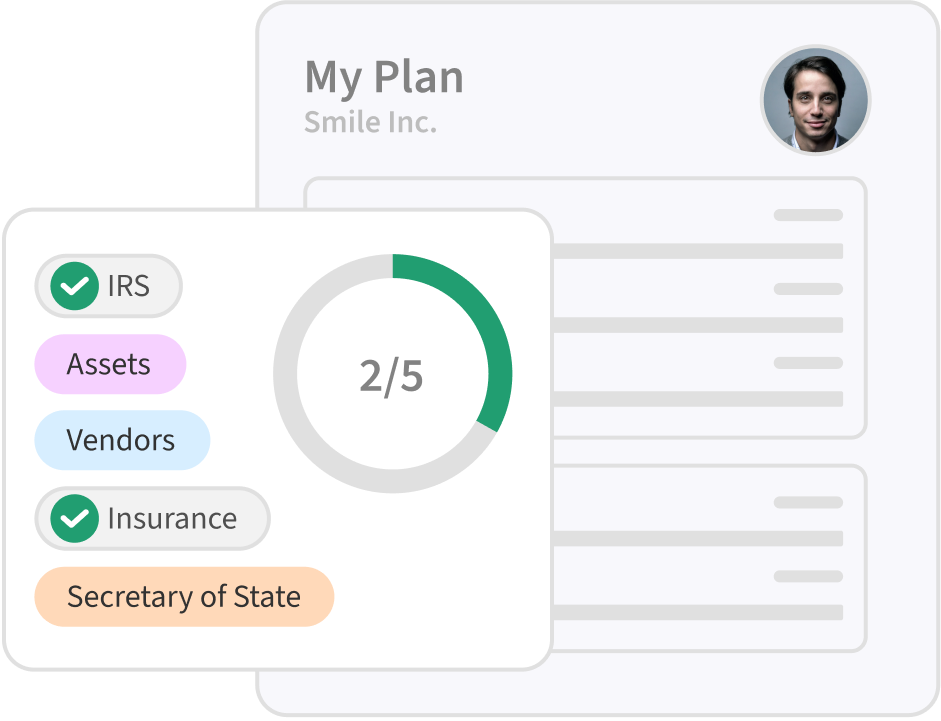As a startup founder, strategies that maximize liquidation proceeds make it easier to settle debts and offer returns to shareholders.
However, the process isn’t as simple as listing your startup’s physical and digital assets for sale. Negotiation strategies also play a big role in maximizing asset returns, the most effective of which are covered in this blog.
Learning points:
What liquidation proceeds and liquidation preferences mean
How to calculate the value of tangible and intangible assets
How to negotiate with potential buyers and maximize return on sales
Get your free founder's guide to shutting down

A comprehensive breakdown of how founders can quickly and easily execute a fully compliant shutdown
What are Liquidation Proceeds?
Liquidation proceeds are the funds obtained from selling a company's assets during the process of shutting down a business. These proceeds are used to pay off creditors, settle obligations, and distribute any remaining funds to shareholders and other stakeholders.
What is Liquidation Preference?
Liquidation preference is the order in which investors and creditors are paid from the money obtained by selling the company's assets. It is determined both by law and contractual agreements.
How Can Startups Determine How Much Their Current Assets Are Worth?
Start by thoroughly inventorying all assets, including physical (e.g., office equipment, furniture) and non-physical (e.g., intellectual property, software licenses).
Next, it’s time to determine the current value of these assets. You have two options in this regard: get professional help or take the DIY (Do it yourself) route.
Option 1: Hire a professional appraiser to assess the value of significant or complex assets. This is especially useful for high-value items, specialized equipment, intellectual property, or when precise market valuation is needed.
Option 2: The DIY route – a startup’s finance team or accountant usually handles this process. They either use accounting software or financial records to track original purchase prices and depreciation (to calculate what’s otherwise known as Book Value).
The other method – also called Market Valuation – involves researching similar items on online marketplaces (e.g., eBay, Craigslist), industry-specific platforms, and auction houses. Then, they gauge the price by comparing the condition and demand with similar assets.
How To Maximize the Sale of Physical Assets During Startup Shutdown?
The following are three ways to maximize liquidation proceeds from selling physical assets.
1. Online Marketplaces
Online marketplaces like eBay and Craigslist have tens of thousands of potential buyers. These platforms are cost-effective, user-friendly, and allow users to list items with minimal effort.
Types of assets ideal for sale on this platform:
Office Equipment: Desks, chairs, printers, and monitors.
Electronics: Laptops, tablets, and peripherals.
Furniture: Office furniture, shelving units, and conference tables.
2. Auction Houses
Auction houses are experts in valuing and selling assets and generally attract the right buyers. Due to competitive bidding and the auction house's repute, you can fetch higher prices for your assets.
However, auction houses typically charge significant commissions that can cut deep into net profits. If the figures don’t make financial sense, look to other options.
Types of assets ideal for sale on this platform:
Specialized Equipment: High-value machinery, lab equipment, and industry-specific tools.
Artwork and Collectibles: High-value decorative items, limited edition pieces.
Vehicles: Company cars or delivery vehicles.
3. Direct Sales
Direct sales to competitors, industry partners, or local businesses can result in quicker transactions and better prices since these buyers understand the asset's true value.
Types of assets ideal for sale:
Proprietary Tools: Custom-built or specialized tools used in your specific industry.
Bulk Office Supplies: Large quantities of office supplies and consumables.
Company-Owned Property: Real estate or leased properties that can be transferred.
How to Maximize the Sale of Non-Physical Assets During Startup Shutdown?
1. IP Marketplaces & Dissolution Specialists (IP)
Specialized IP marketplaces and corporation dissolution specialists can market your startup's assets to the right buyers, ensuring they are sold at a fair price. They usually have networks of potential buyers specifically interested in acquiring intellectual property.
Patents, trademarks, copyrights, trade secrets and proprietary technology all fall under this category.
Types of assets ideal for sale:
Patents: Innovations, unique processes, or technologies.
Trademarks: Brand names, logos, and other identifiers.
Copyrights: Original content, software code, and creative works.
Trade Secrets: Proprietary knowledge, such as pricing, customer lists, and competitive research.
2. Software Marketplaces and Industry Partners
These include industry competitors, partners, and companies who can directly integrate the software into their operations or use it to enhance their product line.
Types of assets ideal for sale:
Proprietary Software: Custom-built software solutions and platforms.
SaaS Products: Subscription-based software services with existing user bases.
3. Data Marketplaces and Industry Buyers
Selling customer contracts and data to companies in the same industry can be highly lucrative. These companies can leverage the existing customer base to expand their market share.
However, compliance with data protection regulations is crucial to avoid legal issues. This includes adhering to GDPR, CCPA, or other relevant laws governing personal data handling and transferring.
Types of assets ideal for sale:
Customer Contracts: Long-term service agreements and subscription contracts.
Customer Data: Databases containing valuable customer information, usage statistics, and purchase history.
Client Lists: Lists of current and potential clients with contact information and engagement history.
3 Negotiation Tactics to Maximize Liquidation Proceeds From the Sale of Physical Assets
1. Highlight Unique Selling Points
Emphasize any unique features or advantages of the asset to potential buyers. For example, highlight the excellent condition, brand reputation, or recent office equipment or specialized tools upgrades.
2. Offer Flexible Pricing and Terms
Be open to negotiating the price and terms of sale. Offering payment plans (only an option if an immediate startup shutdown isn’t on the cards), bulk purchase discounts, or bundling multiple items can make the deal more attractive.
3. Create a Sense of Urgency
Communicate a sense of urgency to potential buyers to expedite the sale. Limited-time offers or first-come, first-served terms can prompt quicker decisions.
3 Negotiation Tactics to Maximize Liquidation Proceeds From the Sale of Non-Physical Assets
1. Showcase Strategic Value
Clearly articulate how the asset will benefit the buyer strategically, such as expanding their market share, enhancing their product line, or acquiring valuable IP.
2. Deliver Professional Presentations
Provide detailed, professional documentation and presentations to prospects. This includes financial projections, potential ROI, and case studies demonstrating the asset's value.
3. Ensure Legal and Compliance Assurance
Offer assurances regarding the legal and compliance status of the assets, especially for customer data and IP. Providing proof of compliance with data protection regulations can increase buyer confidence.
Conclusion
To maximize liquidation proceeds, startups can utilize proper channels along with effective negotiation strategies.
Ready to unlock the full value of your startup's assets during dissolution? SimpleClosure provides the expertise and support you need to maximize liquidation proceeds and simplify the entire process.


